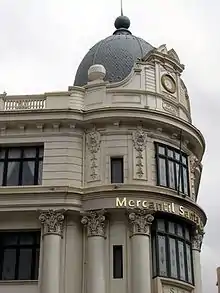Banco Mercantil Santa Cruz
Banco Mercantil Santa Cruz S.A. doing business as Mercantil Santa Cruz (abbreviated as BMSC) is a Bolivian bank and financial services company with headquarters in La Paz. As of 2015, Banco Mercantil Santa Cruz is the largest bank in Bolivia by assets.[3] It is a full-service corporation that provides a wide range of financial products and services to an individual and corporate client base through a national network of operating 93 branches, more than 350 ATMs, call centers, and online and mobile banking platforms.
 | |
| Type | Public |
|---|---|
| BBV: BME | |
| Industry | Banking, Financial services |
| Predecessor | Banco Mercantil Banco Santa Cruz |
| Founded | December 11, 1905 (as Banco Mercantil) May 26, 1966 (as Banco de Santa Cruz de la Sierra) 2006 (current) |
| Founder | Simón I. Patiño (for Banco Mercantil) |
| Headquarters | , |
Area served | Bolivia |
Key people | Darko Zuazo Batchelder Chairman & CEO |
| Products | Consumer banking, corporate banking, finance and insurance, investment banking, mortgage loans, wealth management, credit cards, |
| Revenue | |
| Total assets | |
Number of employees | 1,873 (2014)[2] |
| Divisions | SAFI Mercantil Santa Cruz, Mercantil Santa Cruz Agencia de Bolsa, Universal Brokers, Warrant Mercantil Santa Cruz |
| Website | www.bmsc.com.bo |
Banco Mercantil Santa Cruz was created in 2006 by the merger of Banco Mercantil and Banco Santa Cruz, which began operations in 1905 and 1966 respectively.
History
Banco Mercantil
The history of Banco Mercantil Santa Cruz dates back to December 11, 1905, when Simón I. Patiño, a Bolivian magnate who was among the world's wealthiest people at the time of his death, founded Banco Mercantil. Its headquarters were established in Oruro, which at that time it was the main mining center of Bolivia. The bank was set with an initial capital of physical gold worth £1,000,000, which were transferred from London to Oruro.[4] Under those conditions, Banco Mercantil opened its doors to the public on December 1, 1906, also inaugurating branches in La Paz, Cochabamba, Sucre, Potosí, Santa Cruz de la Sierra and Antofagasta. In 1907, Bolivia suffered an economic downturn due to the global financial crisis that occurred that year. As a result, many mining companies, which played a significant role in the businesses of the bank were forced to close. After the crisis, Patiño made a significant increase of capital to the bank in order to save it from bankruptcy. By 1910, Banco Mercantil became Bolivia's largest bank, surpassing the older Banco Nacional de Bolivia.
In 1926, Banco Mercantil moved its headquarters to La Paz, the country's seat of government. The bank, which was primarily created to do businesses with the mining industry, reached its peak in the first half of the twentieth century. In 1947, Patiño passed away and his heirs transferred their shares to the Fundación Universitaria Patiño, a philanthropic organization. In 1968, all the bank's shares were subsequently sold to a group of private investors in Bolivia.[5] Until 2006, Banco Mercantil was Bolivia's largest private bank.[6]
Banco Santa Cruz
On September 24, 1966, following an authorization from the Superintendency of Banks and Financial Institutions of Bolivia, the Bank of Santa Cruz de la Sierra S.A. was officially inaugurated in Santa Cruz de la Sierra. In July 1992, its corporate name was changed to Banco Santa Cruz S.A. Within the next few years, the company quickly developed and expanded its network of branches to all major cities in Bolivia, including La Paz, Cochabamba, Oruro, Sucre and Tarija. Banco Santa Cruz was renowned for its innovative operations, becoming the first financial company in Bolivia in implementing online banking, drive-through banking agencies, a comprehensive network of ATMs and the largest network of branches in the country and abroad. On July 12, 1998, 90% of the shares of Banco Santa Cruz S.A. were sold to the Spanish Banco Central Hispano. In January 1999, Banco Central Hispano merged with Banco Santander, creating a new financial institution called Banco Santander Central Hispano (BSCH). Until October 2001, Banco Santander Central Hispano had a 95.76% stake in the Bolivian bank. On April 18, 2006, Grupo Santander, announced the sale of all of its shares to Banco Mercantil, which acquired Banco Santa Cruz thus creating a new company under the name of Banco Mercantil Santa Cruz S.A. The merger of the two companies resulted in the creation of Bolivia's largest bank.[7]
Operations
As of 2014, Banco Mercantil Santa Cruz offers its services through 93 branches, more than 350 ATMs, as well as online and mobile banking platforms. It serves 457.791 clients in Bolivia. Some of its offered financial services include. Consumer Banking is the largest division in the company, and provides financial services to consumers and small businesses.
- Certificates of deposit/Term deposits
- Mobile Banking
- Credit cards
- Microfinance
- Mortgage loans
- Saving accounts
- Insurance brokerage
- Advice services
- Securitization
External links
References
- "Memoria anual 2014" [Annual Report 2014] (PDF) (in Spanish). Banco Mercantil Santa Cruz S.A. Retrieved 27 July 2016.
- "Siete bancos nacionales escalan puestos en un ranking regional" (in Spanish). Página Siete. October 27, 2015.
- "104 años de la Creación del Banco Mercantil" (in Spanish). La Patria. Retrieved 28 July 2016.
- "Hitos de nuestros primeros 100 años" (PDF) (in Spanish). Banco Mercantil. Retrieved July 30, 2016.
- "Historia del Banco Mercantil Santa Cruz" (in Spanish). Retrieved July 30, 2016.
- "Historia del Banco Santa Cruz" (in Spanish). stesa.com. Retrieved July 30, 2016.
- "El Banco Mercantil es el banco más grande de Bolivia" (in Spanish). Página Siete. Retrieved July 30, 2016.
- "Bolivia's Best Bank: Banco Mercantil Santa Cruz". Latin Finance. Retrieved July 30, 2016.
